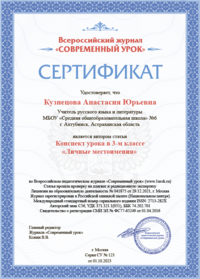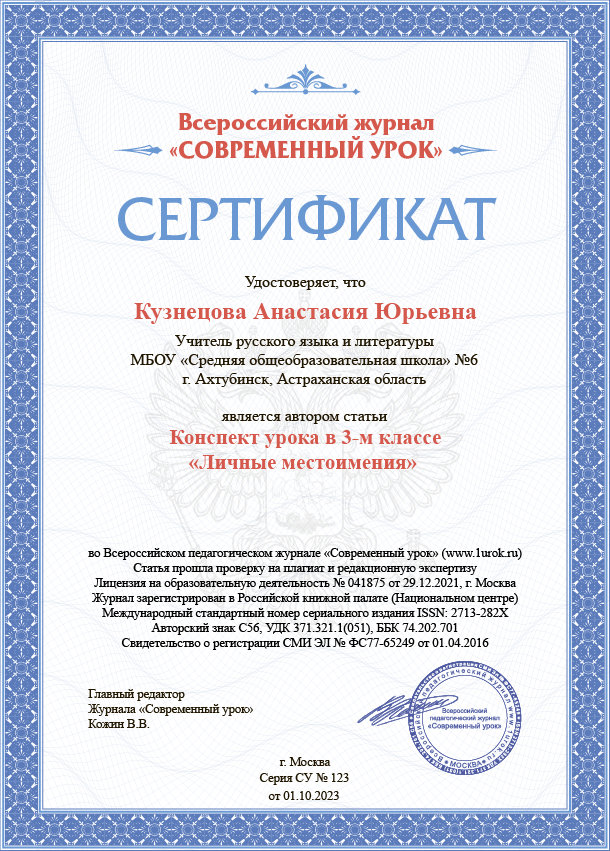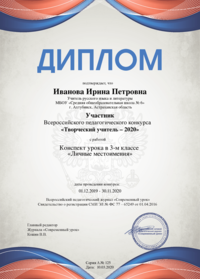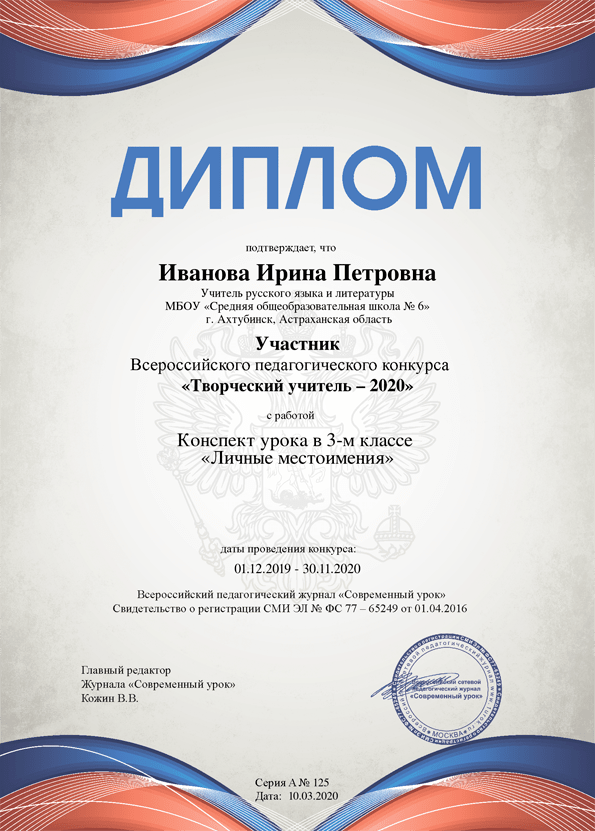Сборник упражнений для подготовки к ЕГЭ по английскому языку: раздел «Словообразование»
Автор: Звонкова Татьяна Юрьевна
Организация: МБОУ СОШ № 2
Населенный пункт: г. Смоленск
Пояснительная записка
Данное методическое пособие содержит 6 отрывков из произведений известных английских писателей (L. M. Montgomery Anne of Green Gables, F. H. Burnett The secret garden и E. M. Forster A room with a view), адаптированных под формат упражнений на словообразование к ЕГЭ по английскому языку. Задания будут полезны не только при подготовке в ЕГЭ, их можно использовать на уроках английского языка в старших классах и на факультативных занятиях. В конце пособия есть ключи.
Extract 1
|
For reasons best known to herself, Marilla did not tell Anne that she was to stay at Green Gables until the next afternoon. During the forenoon she kept the child busy with 1) _________ (VARY) tasks and watched over her with a keen eye while she did them. By noon she had concluded that that Anne was smart and 2) ________ (OBEY), willing to work and quick to learn; her most serious shortcoming was seemed to be a tendency to fall into daydreams in the middle of the task and forget all about it until such time as she was sharply recalled to earth by a reprimand or a catastrophe. When Anne had finished washing the dinner dishes she 3) __________ (SUDDEN) confronted Marilla with the air and expression of one desperately determined to learn the worst. Her thin little body trembled from head to foot: her face flushed and her eyes delated until they were almost black; she clasped her hands tightly and said in an 4) ___________ (IMPLORE) voice: “Oh, please, Miss Cuthbert, won’t tell me if you are going to send me away or not? I’ve tried to be patient all morning, but I really feel that I cannot bear not knowing any longer. It’s a dreadful feeling. Please tell me”. “You haven’t scalded the dishcloth in clean hot water as I told you,” said Marilla 5) ______________ (MOVE). “Just go and do it before you ask any more questions, Anne. Anne went and attended to the dishcloth. Then she returned to Marilla and fastened imploring eyes of the latter’s face. “Well”, said Marilla, unable to find any excuse for deferring her 6) ___________ (EXPLAIN) longer, I suppose I might as well tell you. Matthew and I have decided to keep you – that is, if you will try to be a good girl and show yourself grateful. Why, child, whatever is the matter?” “I’m crying”, said Anne in a tone of 7) __________ (BEWILDER). “I can’t think why. I am glad as glad can be. Oh, GLAD doesn’t seem the right word at all. I was glad about the White Way and the cherry blossoms – but this! Oh, it’s something more than glad. I’m so happy. I’ll try to be so good. It will be uphill work, I expect, for Mrs. Thomas often told me I was 8) _________ (DESPAIR) wicked. However, I’ll do my very best. But can you tell me why I’m crying?” “I suppose it’s because you’re all excited and worked up”, said Marilla 9) ______________ (APPROVE). “Sit down on that chair and try to calm yourself. I’am afraid you both cry and laugh far too easily. Yes, you can stay here and we will try to do right by you. You must go to school; but it’s only a 10) ________ (NIGHT) till vacation so it isn’t worth while for you to start before it opens again in September.
L. M. Montgomery Anne of Green Gables p. 66-67 |
Extract 2
|
Spring has come once more to Green Gables – the beautiful capricious, reluctant Canadian spring, lingering along through April and May in a succession of sweet fresh chilly days, with pink sunsets and miracles of resurrection and 1) _______ (GROW). The maples on Lover’s lane were red budded and little curly ferns pushed up around the Dryad’s Bubble. Away up in the barrens, behind Mr. Silas Sloane’s place, the Mayflowers blossomed out, pink and white stars of 2) ________ (SWEET) under their brown leaves. All the school girls and boys had one golden afternoon gathering them, coming home in the clear, echoing twilight with arms and baskets full of 3) ________ (FLOWER) spoil. “I am sorry for people who live in lands where there are no Mayflowers”, said Anne. “Diana says perhaps they have something better, but there couldn’t be anything better than Mayflowers, could there, Marilla? And Diana says if they don’t know what they are like they don’t miss them. But I think that she is the 4) _______ (SAD) thing of all. I think it would be TRAGIC, Marilla, not to know what Mayflowers are like and NOT to miss them. Do you know what I think Mayflowers are, Marilla? I think they must be the souls of the flowers that died last summer and this is their heaven. But we had a splendid time today, Marilla. We had our lunch down in a big mossy hollow by an old well – such a romantic spot. Charlie Sloane dared Arty Gillis to jump over it, and Arty did because he wouldn’t take a dare. Nobody would in school. It is a very 5) _________ (FASHION) to dare. Mr. Phillips gave all the Mayflowers he found to Prissy Andrews and I heard him to say “sweet to sweet. He got that out of the book, I know, but it shows he has some 6) _________ (IMAGINE). I was offered some Mayflowers too, but I rejected them with scorn. I can’t tell you the person’s name because I have vowed never to let it cross my lips. We made wreaths of Mayflowers and put them on our hats; and when the time came to go home we marched in procession down the road, two by two, with our bouquets and wreaths, singing “My home on the hill”. Oh, it was so 7) _________ (THRILL), Marilla. All Mr. Silas Sloane’s folks rushed out to see us and everybody we met on the road stopped and stared after us. We made a real sensation. “Not much wonder! Such silly doings!” was Marilla’s response. After the Mayflowers came the violets, and Violet Vale was empurpled with them. Anne walked through it on her way to school with reverent steps and 8) _________ (WORSHIP) eyes, as if she trod on holy ground. “Somehow” she told Diana, “when I’m going through here I don’t really care whether Gil –whether anybody gets ahead of me in class or not. But when I am up in school it’s 9) ________ (DIFFER) and I care as much as ever. There’s such a lot of different Annes in me.
I somethimes think that is why I’m such a 10) _________ (TROUBLE) person. If I was just the one Anne it would be ever so much more comfortable, but then it wouldn’t be half so interesting”.
L. M. Montgomery Anne of Green Gables p. 197-198 |
Extract 3
|
She looked at the key quite a long time. She turned it over and over, and thought about it. As I said before, she was not a child who had been trained to ask 1) _______ (PERMIT) or consult her elders about things. All she thought about the key way that if it was the key to the closed garden, and she could find out where the door was, she could perhaps open it and see what was inside the walls, and what had happened to the rose trees. It was because it had been shut up so long that she wanted to see it. It seemed as if it must be 2) _____________ (DIFFER) from other places and that something strange must have happened to it during ten years. Besides that, if she liked it she could go into it every day and shut the door behind her, and she could make up some play of her own and play it quite alone, because nobody would ever know where she was, but would think the door was still locked and the key buried in the earth. The thought of that pleased her very much. Living, as it were, all by myself in a house with a hundred 3) ___________ (MYSTERY) closed rooms and having nothing whatever to do to amuse herself, has set her inactive brain to work and was actually awaking her 4) __________ (IMAGE). There is no doubt that the flesh, strong, pure air from the moor had a great deal to do with it. Just as it had given her an appetite, and fighting with the wind had stirred her blood, so the same things had stirred her mind. In India she had always been too hot and languid and weak to care much about anything, but in this place she was beginning to care and to want to do new things. Already she felt less “contrary”, though she did not know why. She put the key in her pocket and walked up and down her walk. No one but herself ever seemed to come there, so she could walk slowly and look at the wall, or, rather, at the ivy growing on it. The ivy was the baffling thing. Howsoever 5) __________ (CARE) she looked, she could see nothing but thickly growing, glossy, dark green leaves. She was very much disappointed. Something of her 6) ___________ (CONRARY) came back to her as she paced the wall and looked over it at the tree-tops inside. It seemed so silly, she said to herself, to be near it and not be able to get in. She took the key in her pocket when back to the house, and she made up her mind that she would always carry it with her when she went out, so that if she ever should find the hidden door she would be ready. Mrs Medlock had allowed Martha to sleep all night at the cottage, but she was back at her work in the morning with cheeks redder than ever and in the best of spirits. “I got up at four o’clock”, she said. “Eh! It was pretty on the moor with th’ birds getting up and th’ rabbits scamperin’ about an th’ sun risin’. I didn’t walk all th’ way. A man gave me a ride in his cart an’ I can tell you I did enjoy myself. She was full of stories of the delights of her day out. Her mother had been glad to see her, and they had got the baking and washing all out of the way. She had even made each of the 7) _________ (CHILD) a dough-cake with a bit of brown sugar in it. I had them all pipin’ hot when they came in from playin’ on th’ moor. An’th’ cottage all smelt o’nice, clean, hot bakin’an’there was a good fire, an’they just shouted for joy. Our Dickon, he said our cottage was good enough for a king to live in”. Frances Hodgson Burnett The secret garden p. 58-59 |
Extract 4
|
Mary took the picture back to the house when she went to her supper and she showed it to Martha. “Eh!” said Martha with great pride. “I never knew our Dickon was as clever as that. That there’s a picture of a missel thrush on her nest, as large as life an’ “twice as 1) __________ (NATURE)”. Then Mary knew Dickon had meant the picture to be a message. He had meant that she might be sure he would keep her secret. Her garden was her nest and she was like a missel thrush. Oh, how she did like that queer, common boy! She hoped he would come back the very next day and she fell asleep looking forward to the morning. But you never know what the weather will do in Yorkshire, 2) _____________ (PARTICULAR) in the springtime. She was awakened in the night by the sound of rain beating with heavy drops against her window. It was pouring down in torrents and the wind was “wuthering” round the corners and in the chimneys of the huge old house. Mary set up in bed and felt miserable and 3) ________ (ANGER). “The rain is as contrary as I ever was” she said. “It came because it knew I did not want it”. She threw herself back on her pillow and buried her face. She did not cry, but she lay and hated the sound of the 4) ________ (HEAVY)-beating rain, she hated the wind and its “wuthering”. She could not go to sleep again. The mournful sound kept her awake, because she felt mournful herself. If she had felt happy it would 5) __________ (PROBABLE) have lulled her to sleep. How it “wuthered” and how the big raindrops poured down and beat against the pane! “It sounds just like a person lost on the moor and wandering on and on crying”, she said. She has been lying awake, turning from side to side for about an hour, when 6) __________ (SUDDEN) something made her sit up in bed and turn her head towards the door listening. She listened and she listened. “It isn’t the wind now”, she said in a loud whisper. “That isn’t the wind. It is different. It is that crying I heard before. The door of her room was ajar and the sound came down the corridor, a far-off faint sound of fretful crying. She listened for a few minutes and each minute she became more and more sure. She felt as if she must find out what it was. It seemed even stranger than the secret garden and the buried key. Perhaps the fact that she was in a 7) __________ (REBEL) mood made her bold. She put her foot out of bed and stood on the floor. “I am going to find out what it is, she said. “Everybody is in bed and I don’t care about Mrs Medlock – I don’t care!” There was a candle by her bedside and she took it up and went 8) _______ (SOFT) out of the room. The corridor looked very long and dark, but she was too excited to mind that. She thought she remembered the corners she must turn to find the short corridor with the door covered with tapestry – the one Mrs Medlock had come through the day she lost herself. The sound had come up that passage. So she went on with her dim light, almost feeling her way, her heart beating so loud that she fancied she could hear it. The far-off faint crying went on and led her. Sometimes it stopped for a moment or so and then began again. Was this the right corner to turn? She stopped and thought. Yes, it was. Down this passage and then to the left, and then up two broad steps, and then to the right again. Yes, there was the tapestry door.
Frances Hodgson Burnett The secret garden p. 96-97 |
Extract 5
|
Some complicated game had been playing up and down the hillside all the afternoon. What it was and exactly how the players had sided, Lucy was slow to discover. Mr. Eager had met them with a questioning eye. Charlotte had repulsed him with much small-talk. Mr. Emerson, seeking his son, was told whereabouts to find him. Mr. Beebe, who wore the heated aspect of a neutral, was bidden to collect the factions for the return home. There was a general sense of groping and 1) ________ (BEWILDER). Pan had been amongst them – not the great god Pan, who has been buried these two thousand years, but the little god Pan, who presides over social contretemps and 2) ________ (SUCCESS) picnics. Mr. Beebe had lost everyone, and had consumed in solitude the tea-basket which he had brought up as a pleasant surprise. Miss Lavish had lost Miss Barlett. Lucy had lost Mr. Eager. Mr Emerson had lost George. Miss Barlett had lost a mackintosh square. Phaeton had lost the game. That fact was 3) _________ (DENY). He climbed onto the box shivering, with his collar up, prophesying the swift approach of bad weather. “Let us go immediately”, he told them. “The signorino will walk”. “All the way? He will be hours”, said Mr. Beebe. “4) __________ (APPARENT). I told him it was unwise”. He would look no one in the face; perhaps defeat was particularly mortifying for him. He alone had played skillfully, using the whole of his instinct. While the others had used scraps of their 5) __________ (INTELLIGENT). He alone had divined what things were, and what he wished them to be. He alone had interpreted the message that Lucy had received five days before from the lips of a dying man. Persephone, who spends half her life in the grave – she could interpret it also. Not so these English. They gain 6) __________ (KNOW) slowly, and perhaps too late. The thoughts of a cab-driver, however just, seldom affect the lives of his employers. He was the most competent of Miss Bartlett’s opponents, but infinitely the least dangerous. Once back in the town, he and his insight and his knowledge would trouble English ladies no more. Of course, it was the most 7) ___________ (PLEASURE); she had seen his black head in the bushes; he might make a tavern story out of it. But, after all, what have we to do with tavern? Real menace belongs to the drawing-room. It was of drawing-room people that Miss Barlett thought as she journeyed downwards towards the fading sun. Lucy sat beside her; Mr Eager sat opposite, trying to catch her eye; he was vaguely 8) __________ (SUSPITION). They spoke of Alessio Baldovinetti. Rain and darkness came on together. The two ladies huddled together under an inadequate parasol. There was a lightning flash, and Miss Lavish, who was nervous, screamed from the carriage in front. At the next flash, Lucy screamed also. Mr. Eager addressed her 9) ___________ (PROFESSION). “Courage, Miss Honeychurch, courage and faith. If I might say so, there is something almost blasphemous in this horror of the elements. Are we seriously to suppose that all these clouds, all this immense electrical display, is simply called into existence to extinguish you or me?” “No- of-course –“ “From the 10) __________ (SCIENCE) standpoint the chances against our being struck are enormous. The steel knives, the only articles which might attract the current, are in the other carriage. And, in any case, we are infinitely safer than if we were walking. Courage – courage and faith”. E. M. Forster A room with a view p. 71-72 |
Extract 6
|
The Comic Muse, though able to look after her own interests, did not disdain the 1) _______ (ASSIST) of Mr. Vyse. Hid idea of bringing the Emerson to Windy Corner struck her as decidedly good, and she carried through the 2) _________ (NEGOTIATE) without a hitch. Sir Harry. Otway signed the agreement, met Mr. Emerson, and wrote a dignified letter to Lucy, whom they held responsible for the failure. Mr. Beebe planned pleasant moments for the newcomers, and told Mrs. Honeychurch that Freddy must call on them as soon as they arrived. Indeed, so ample was the Muse’s equipment that she permitted Mr. Harris, never a robust 3) ________ (CRIME), to droop his head, to be forgotten and to die. Lucy – to descend from bright heaven to earth, where on there are shadows because they are hills. Lucy was at first plunged into despair, but settled after a little thought that it did not matter the very least. Now that she was engaged, the Emersons would scarcely insult her, and were welcome to come into the 4) ___________ (NEIGHBOR). And Cecil was welcome to bring whom he would into the neighborhood. But as I say, this took a little thinking, and – so 5) ______ (LOGIC) are girls – the event remained rather and rather more dreadful than it should have done. She was glad that a visit to Mrs Vyse now fell due; the tenants moved into Cissie Villa while she was safe in the London flat. “Cecil – Cecil darling’, she whispered the evening she arrived. And crept into his arms. Cecil, too, became 6) ___________ (DEMONSTRATE). He saw that the needful fire had been kindled in Lucy. At last she longed for attention, as a woman should, and looked up to him because he was a man. “So you do love me, little thing?” he murmured. “Oh, Cecil, I do, I do! I don’t know what I should do without you”. Several days passed. Then she had a letter from Miss Bartlett. A coolness had sprung up between the two cousins, and they had not corresponded since they parted in August. The coolness dated from what Charlotte would call “the flight to Rome”, and in Rome it had increased 7) ________ (AMAZE). For the companion who is merely uncongenial in the medieval world becomes exasperating in the classical. Charlotte, unselfish in the Forum, would have tried a sweeter temper than Lucy’s, and once, in the Baths of Caracalla, they had doubted whether they could continue their tour. Lucy had said she would join the Vyses – Mrs Vyse was an acquaintance of her mother, so there was no impropriety in the plan – and Miss Bartless had replied that she was quite used to being abandoned 8) ________ (SUDDEN) . Finally nothing happened; but the coolness remained, and, for Lucy, was even increased when she opened the letter and read as follows. It had been forwarded from Windy Corner.
E. M. Forster A room with a view p. 71-72 |
Keys
Extract 1
1) various, 2) obedient, 3) suddenly, 4) imploring, 5) immovably, 6) bewilderment, 7) desperately, 8) disapprovingly, 9) fortnight
Extract 2
1) growth, 2) sweetness, 3) flowery, 4) saddest, 5) fashionable, 6) imagination, 7) thrilling, 8) worshiping, 9) different
Extract 3
1) permission, 2) different, 3) mysteriously, 4) imagination, 5) carefully, 6) contrariety, 7) children
Extract 4
1) natural, 2) particularly, 3) angry, 4) heavily, 5) probably, 6) suddenly, 7) rebellious, 8) softly
Extract 5
1) bewilderment, 2) unsuccessful, 3) undeniable, 4) apparently, 5) intelligence, 6) knowledge, 7) unpleasant, 8) suspicious, 9) professionally, 10) scientific
Extract 6
1) assistance, 2) negotiation, 3) criminal, 4) neighborhood, 5) illogical, 6) demonstration, 7) amazingly, 8) suddenly
Resources
1. Burnett F. H. The secret garden. – Wordsworth Editions, UK, 2000. – 221 p.
2. Foster E.M. A room with a view. – Penguin English Library, UK, 2012. – 237 p.
3. Mongomery L.M. – Anne of Green Gables. – Издательство АСТ, Москва, 2022. - 384 с.

 БЕСПЛАТНЫЕ семинары
БЕСПЛАТНЫЕ семинары





